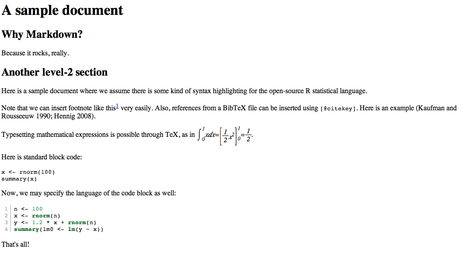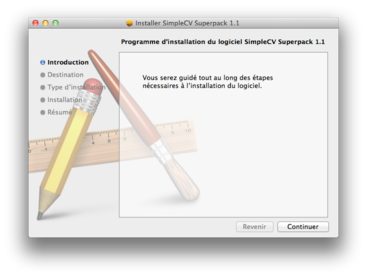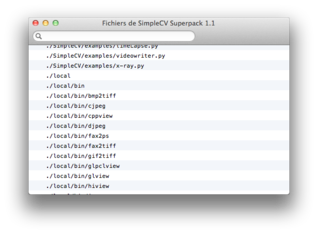Apple weekend miscellanies
Some weekend miscellanies on my Airbook.
Upgrading Haskell
A coupe of weeks ago, I installed the binary distribution (1.8.2) of Pandoc. The binaries are installed in /usr/bin, while the older ones were in ~/.cabal/bin/. To test my installation, I used a fairly basic document with some $\LaTeX$ expressions, references, and code chunk with or without syntax highlighting (because the latest version of Pandoc added support for the R programming language). Here is the test document.
For unknown reason, the citation mechanism via citeproc-hs (0.3.3) was broken because of an hard-coded path, as described in this issue. So, I decided to reinstall Pandoc with cabal as I did before. (This time I had no problem with cabal, though.) So basically,
$ cabal update
$ cabal install cabal-install
$ cabal install highlighting-kate --disable-library-for-ghci
$ cabal install citeproc-hs
$ cabal install pandoc -fhighlighting
And voilà! I should note that a lot of warnings were issued when building the packages, like
ld: warning: text reloc in
This has been referenced on Ticket #5128, and it led me to suspect that I rather need to update my entire Haskell system. Well, that was quick and easy with the Frameworkized version available on http://hackage.haskell.org/platform//mac.html.

Next to that, even if I didn’t get any problem compiling a sample demo program, it throws out some warnings (see partial output below):
$ echo "main = return ()" > Main.hs
$ ghc --make Main
[1 of 1] Compiling Main ( Main.hs, Main.o )
Linking Main ...
ld: warning: could not create compact unwind for _ffi_call_unix64
As discussed on Ticket #5019, I upgraded to the latest GMP (but not MPFR), and this warning disappeared.
Here is a preview of the HTML version of the test document, with working references, syntax highlight and $\LaTeX$ support. (The commands I used were: pandoc pandoc_text.md -s -m --bibliography="ml_dysp.bib" -o 1.html.)

OpenCV
Ah, remember to never install so-called “superpack”, you know the pkg that is supposed to do everything for you (like the scipy-superpack) . Note that I don’t want to denigrate all the efforts made by the maintainers (and for what is worth, maintaining working package on a Mac is a challenging task!), but the problem I have with that approach is that you never know what is installed or whether it will break what you already installed by hand. In my case, I decided to give a try to SimpleCV. I dont’t know why but instead of a simple easy_install simplecv, I choose the packaged binary. As can be seen, a lot of stuff is installed directly in /usr/local`.


There were so many problems with that install (notwithstanding the fact that it targeted Python 2.6, while Python 2.7 is now the default under OS X Lion) that I decided to reinstall everything, that means:
- OpenCV 2.3.11: I used
ccmaketo removelibpngandcudasupport (I had problems when compiling and wanted to get it the easiest way, i.e. not reintalling too much things). - [SimpleCV](http://simplecv.org/, with
easy_install.
At present, most of the demos scripts are working, including face tracking with Airbook built-in camera. I will probably have to tweak the install a little bit in the future. But that’s another story…
-
I noticed there’s a cocoa-based version but I didn’t try it. ↩︎